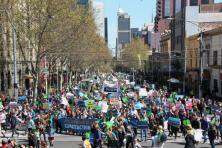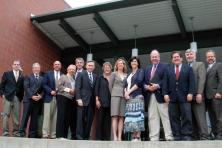
This article is part of The Road through Paris, a series leading up to the COP21 international climate talks in December. It is also the fifth in an eight-week blog series from New Energy Cities detailing the state of the low-carbon city movement.
Leading local governments do not travel alone on the road of climate action—they partner with other jurisdictions and networks to get deeper and faster results. These collaborations have turned low-carbon city efforts into a movement.
Over the past decade and more, the number and scale of international organizations and initiatives helping cities to reduce their carbon footprints has expanded dramatically. By disseminating knowledge, building capacity, and accelerating the adoption of best practices on a large scale, the following efforts have transformed the playing field for cities intent upon carbon reduction:
- C40, former New York Mayor Michael Bloomberg (now the UN Secretary-General’s Special Envoy for Cities and Climate Change), ICLEI, United Cities and Local Governments, and UN-HABITAT are actively promoting city adoption of the Compact of Mayors, the world’s largest coalition of city officials committed to track and reduce urban carbon emissions and increase resilience to climate change. “By sharing best practice through C40—and shamelessly appropriating other cities’ best ideas—we take on climate change and improve the quality of life for our residents,” said London Mayor Boris Johnson.
- In May 2015, ICLEI-Local Governments for Sustainability launched a 10-year Transformative Actions Program to help bold city and sub-national climate strategies gain greater access to capital by promoting them at high-visibility events with potential funders and/or partners.
- The Carbon Neutral Cities Alliance, a signature initiative of the Urban Sustainability Directors Network, is a partnership of officials from across the world whose cities are committed to deep carbon reduction. The Alliance commissioned the Innovation Network for Communities to develop a carbon neutrality planning framework, based on a scan of 17 cities from across the world, which will be available publicly in late 2015.
- In September 2015, at the U.S. – China Climate Leaders Summit, a range of U.S. and Chinese cities committed to take parallel steps to reduce carbon emissions. In support of these pledges, entities and cities in California and China formed the California-China Urban Climate Collaborative, to support policy-makers in climate action planning, develop capacity, and connect cities with clean energy providers. Shenzhen and Los Angeles have also signed a memorandum of understanding to share best practices and lessons learned on how to reduce emissions, and Beijing will explore how to adapt California’s zero-emission vehicle credit trading mechanism, as well as carbon pricing.
Though far from the large scale necessary for dramatic carbon reduction, federal agencies and state governments in the U.S. are fostering local carbon reduction and clean energy innovation. The U.S. Environmental Protection Agency’s State and Local Climate and Energy Program provides technical assistance to cities and counties on reducing carbon emissions and monitoring energy use, drawing on lessons from past grantees.
The U.S. Department of Energy’s Better Buildings program offers peer exchange calls for U.S. cities working toward energy efficiency. The Massachusetts Green Communities Division and New York’s Cleaner, Greener Communities program—both of which receive funding from carbon pricing revenue—encourage cities and towns to increase energy efficiency and renewable energy use through planning and implementation grants.
Local leaders are also organizing themselves. The San Diego Regional Climate Collaborative is a network for public agencies, nonprofit organizations, academia, and businesses to facilitate climate change planning by sharing expertise and leveraging resources. The King County-Cities Climate Collaboration is a similar voluntary partnership of King County, WA and 13 local cities that have committed to a shared work program for cutting regional carbon in half by 2030.
More than ever, urban leaders see that they have the collective power to advance climate and clean energy agendas, and are learning from each other instead of reinventing the wheel.





